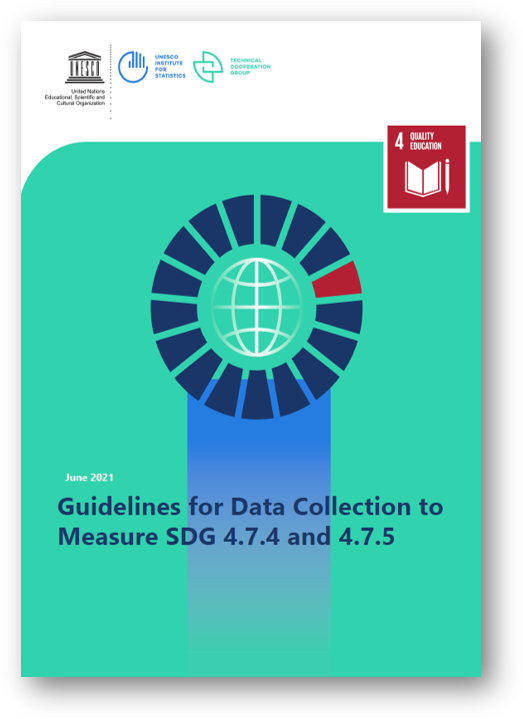
Launch of the newly published Guidelines for Data Collection to Measure SDG 4.7.4 and 4.7.5, a guide on the recently developed measurement strategy to assess SDG indicators!
Following a thorough review and endorsement by the Technical Cooperation Group on the Indicators for SDG 4-Education 2030 (TCG), the measurement strategy has since been applied to the last cycles of TIMSS, PISA and ICCS and has produced scores for 60 countries.
To promote wider participation among UN Member States, as two-thirds of them have yet to participate in these international assessments. The Guidelines for Data Collection to Measure SDG 4.7.4 and 4.7.5 serve as a robust and easy-to-use set of procedures on how to collect the data necessary to produce the information to measure and monitor SDG Indicators 4.7.4 and 4.7.5.
Notably, these guidelines will aid in the production of information that is comparable with that of the 60 countries for which this data already exists.
4.7.4 Percentage of students by age group (or education level) showing an adequate understanding of issues relating to global citizenship and sustainability
4.7.5 Percentage of lower-secondary students showing proficiency in knowledge of environmental science and geoscience
Objectives
Present the Guidelines for Data Collection Measure SDG 4.7.4 and 4.7.5, including the different phases of a nationally representative educational assessment, such as:
- Policy goals
- Instrument development
- Technical standards and operations
- Sample design
- Data collection
- Assessment framework
- Scaling (producing scores and thresholds)
- Reporting and dissemination of results
Speakers
Host: Silvia Montoya, Director, UNESCO Institute for Statistics
Chair: Rolf Strietholt, Co-Unit Head of the Research and Analysis Unit, International Association for the evaluation of Educational Achievement (IEA)
Presenters:
- Andres Sandoval-Hernandez, Reader in Educational Research, University of Bath
- Maria Magdalena Isac, Researcher, KU Leuven
- Diego Carrasco, Researcher, Pontificia Universidad Católica de Chile
- Daniel Miranda, Researcher, Pontificia Universidad Católica de Chile
Reference documents
- Concept Note
- Guidelines for Data Collection to Measure SDG 4.7.4 and 4.7.5
- A Measurement Strategy for SDG Thematic Indicators 4.7.4 and 4.7.5 Using International Large Scale Assessments in Education
- Proposal of a Measurement Strategy for SDG Global Indicator 4.7.1 and Thematic Indicators 4.7.4 and 4.7.5 using International Large-Scale Assessments in Education
